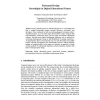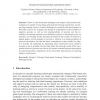21 search results - page 2 / 5 » Challenges in the Development and Evaluation of Immersive Di... |
HCI
2009
13 years 3 months ago
2009
Using computer games for educational purposes is a fascinating idea that is getting increasingly popular amongst educators, researchers, and developers. From a technical as well as...
AAAI
2012
11 years 8 months ago
2012
Goal recognition in digital games involves inferring players’ goals from observed sequences of low-level player actions. Goal recognition models support player-adaptive digital ...
JODI
2002
13 years 5 months ago
2002
The World Wide Web Instructional Committee (WWWIC) at North Dakota State University (NDSU) is in the process of developing interactive and immersive worlds for educational purpose...
CORR
2010
Springer
13 years 6 months ago
2010
Springer
In this paper, we address the problem of creating believable agents (virtual characters) in video games. We consider only one meaning of believability, "giving the feeling of...
ICWL
2007
Springer
14 years 9 days ago
2007
Springer
Abstract. There is little doubt that intelligent and adaptive educational technologies are capable of providing personalized learning experiences and improving learning success. Cu...


